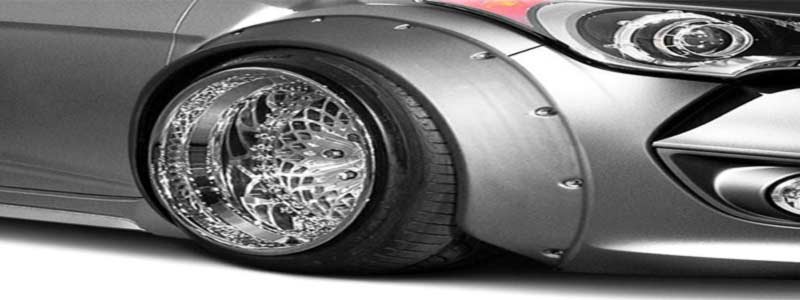A good braking system is arguably one of the most important features of a well-functioning vehicle. Hence, it is quite alarming when a process that is supposedly silent starts producing some grinding noise.
Other than being awfully annoying, the grinding noise often serves as a precursor and a warning for something bad to come. In a very ironic way, it’s actually a good thing that this malfunctioning is audible.
This is because it gives you a rough idea that something isn’t like it is supposed to be. Hence, it’s high-time to get your hands dirty and get to work.
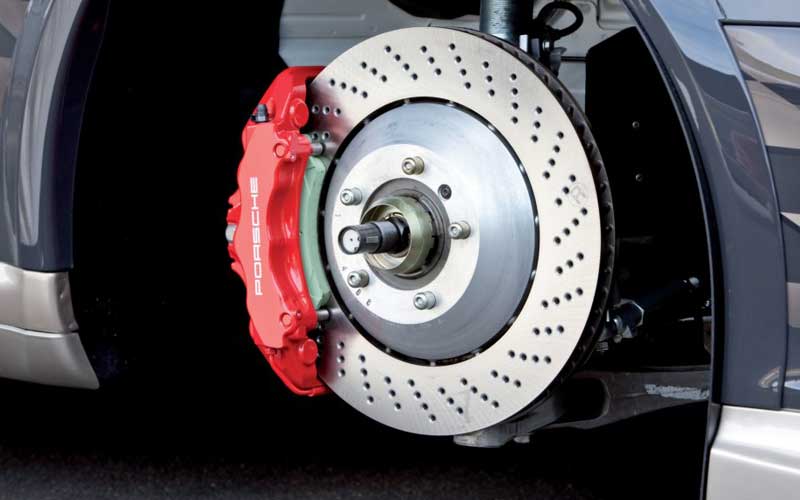
Braking system
In this segment, we’ll go over the main causes of the grinding noise. The main thing to remember here is that the pads are functionally fine and aren’t exhibiting any bag signals. The culprit is the brake and the brake alone.
Let’s get started!
Low quality brake pads
The number one mistake that people often make when setting up their vehicle’s braking system is that they opt for lower quality brake pads.
Though this might be intentional from time to time, in some cases, it’s also the seller or the manufacturer who is selling counterfeit products.
In either case, low quality brake pads, as expected, give in to defects and other structural damage earlier than their original counterparts.
Metal chunks can also cause undue friction in the pads and damage the pads in the long run. The overall result? A grinding noise when you apply the brakes.
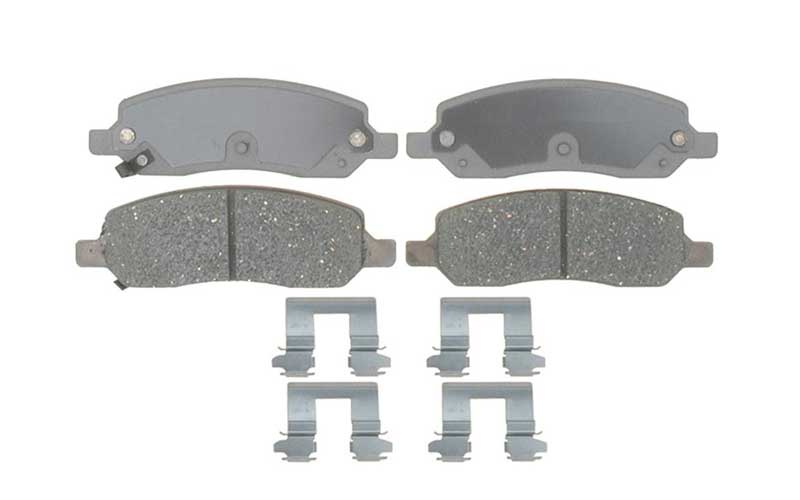
lower quality brake pads
For the best results and return on investment, it is always advised to choose a genuine product from a reputable buyer.
Stuck debris
Debris of any shape and form can get lodged in the rotor and cause damage to the structural integrity of the pads, just as mentioned above.
Along with causing a lot of scraping, this is often the number one root cause of a grinding noise whenever you apply the brakes.
However, the main catch here is that you’ll hear the grinding noise regardless of what you’re doing. It doesn’t matter if you’re applying the brakes or not; the sound will still be there.
If not removed in ample time, this can lead to complete and irreversible damage to the rotor, and the only solution for that is a complete replacement of the unit.
In other cases, debris that is stuck in the system can cause it to get out of alignment. In this scenario, uneven pad wear can result in reduced performance.
If you suspect stuck debris to be the reason for the grinding noise, I would highly advocate for getting it checked as soon as possible. Not doing so can have undesirable consequences down the road.
Worn shims
A shim is a piece that is lodged between spaces with the sole purpose of filling up extra space. In this context, shims are inserted between the brake pads and the brake calipers to fill up the extra space and make up for minor differences.
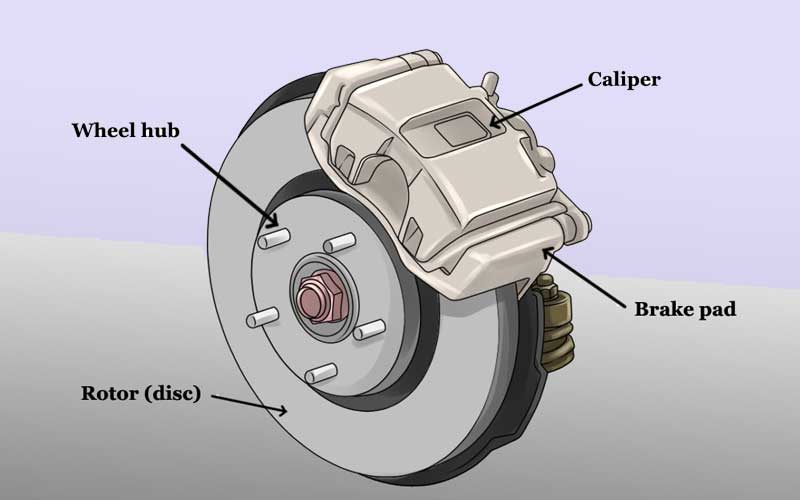
Brake pads and the brake calipers
On most vehicles, shims are adjusted to reduce any type of noise or vibration. Hence, if you’re feeling vibrations, there’s a good chance the shims might have been worn out.
When getting your brakes done, the shims are often looked over by mechanics who are looking for a quick buck. Hence, many brake-related issues often trickle down to this cause.
If shims aren’t replaced from time to time, they get worn out. When worn out, it’s safe to assume that small minuscule pieces break away from the main bit and get stuck in the rotor.
Since shims are made of metal, the metal-on-metal contact produces a grinding noise whenever the brakes are applied.
For optimal performance and general advice to everyone, it’s a good idea to get the shims replaced every now and then.
Infrequent driving
Generally speaking, braking pads are meant to last anywhere between 30,000 to 70,000 miles. It also depends on your driving style and the type of vehicle.
However, if you notice that the braking pads give in way before that number is realized, then the culprit in this case, quite ironically, is infrequent driving.
The main reason for this is that since the vehicle sits idle, exposure to the air and the moisture it holds can lead to rust.
Rust can severally damage small complex components that play an integral part in braking systems. Once damaged, small pieces fall off and come into contact with the rotor, which produces the grinding noise.
Furthermore, rust on the rotors and other parts can also cause quite a lot of friction and result in an overall reduced performance.
The main advice I have for this scenario is to get the whole unit replaced as soon as you can. If rust has already spread in the system, then it’s virtually useless.
In the future, it is highly advised that you don’t let your vehicle sit idle for longer periods of time. This is more important if you live near the coast since the air carries more moisture.
Lack of lubrication
The backside of the brake pad needs to be lubricated using a brake caliper lube, especially during installation.
If this small yet important step is missed, then you’re gearing for more damage down the road, both metaphorically and literally.
By ignoring this step, what essentially happens is that the metal of the pads and the metals of the caliper piston come into contact with each other. Since they’re into contact and are both solid surfaces, this can produce grinding noise.
To prevent this, I would suggest that you pay due attention to the details when going over the installation process. Furthermore, make sure that you follow through completely when working with the reinstallation.
This is arguably the easiest way to prevent any issues or problems, which is why it also has the most benefit.
Worn brake rotors
Generally speaking, everything eventually trickles down to rotors. This is because of the important role they play in the whole braking mechanism.
If the rotors are bad or worn, then they are very likely to produce a plethora of noises. Likewise, if they aren’t flat and are warped, then there’s a good chance they’ll also produce squealing noises.
Other than being very annoying, this can also be quite dangerous. Last but not least, another consequence that worn-out rotors carry is vibrations. This won’t be entirely consistent and is likely to be very sporadic. On some occasions, the intensity can be so much that you’ll actually feel it through your feet.
Furthermore, your steering wheel might start vibrating as well. For novice drivers, this can also cause a lot of issues since they aren’t accustomed to such irregularities when driving.
The most optimal solution for this, if you feel that brake rotors are the main culprit, is to get the unit changed.
In this scenario, I would also suggest that you look into reputable sellers and get something legitimate and authentic. Cheap knock-offs break up easily and can make your experience devastating down the road.
Note that if the sound that is produced isn’t entirely grinding and resembles more of a squeak or a squeal, then you don’t have to get the unit replaced entirely.
Any good mechanic will take one look at it and suggest a resurfacing to get the job done. This treatment is also known as turning.
Faulty wheel bearing
Faulty wheel bearings are a unique culprit when it comes to the grinding noise whenever you apply the brakes.
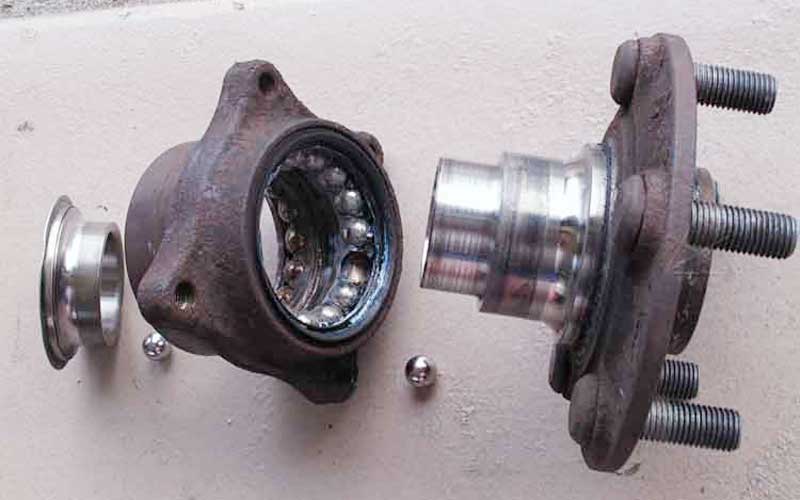
Faulty wheel bearing
The main thing to watch out for in this case, along with the grinding noise, is vibration. If it ranges from intense to light periodically and also accompanies a grinding noise, then you have a faulty wheel bearing.
Although not as dangerous as the other causes mentioned above, it’s still a good choice to take due care and get matters sorted out quickly.
Note: Watch out for the steering wheel. Since it will be vibrating, you might have trouble driving if you’re not experienced enough since the sensation can be a little uncomfortable.
Caliper bolts
The reason I’ve mentioned caliper bolts the last is because this scenario is the least likely to occur.
Since most people often skip on the lubrication process, the caliper bolts suffer as well. Even if they don’t, this bit is often overlooked and has consequences down the road.
However, this often happens if the job is done by an amateur or someone who isn’t acquainted with the intricacies of the braking system.
A professional will most probably lubricate the system to set it back to normal or get you a new pair if the damage is irreversible.
Final thoughts
Now that we’ve addressed the main causes, it’s time to get your detective hat on and find the culprit. I would highly suggest that you get professional help if you want the matter sorted permanently. However, if you’re looking for a quick fix, you can get it done in the garage as well!

